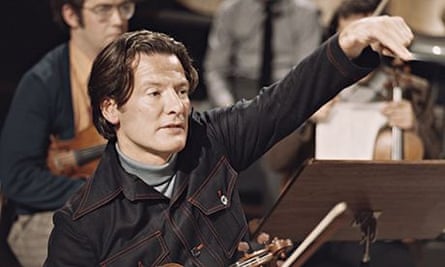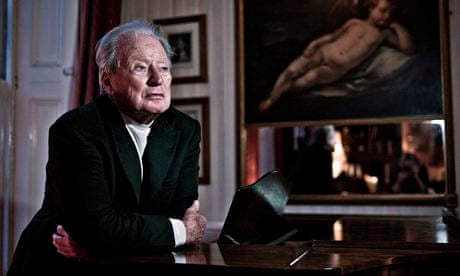‘When you’re geriatric,” says Neville Marriner with an amiable laugh, “everybody wants to be there when you collapse.” His wife, Molly, joins in the laughter as we take tea in the couple’s flat in Kensington, London, but at least one of us is feeling a little uneasy about this turn in the conversation.
I’d asked the conductor, who turns 90 tomorrow, why he thinks he continues to receive so many job offers from around the world. He spent December conducting three different orchestras in Poland, then hopped over to Sweden for another, before conducting a Christmas concert in Düsseldorf. “As I left they said, ‘See you in September?’ It’s very hard to say no.” Why? “Optimism or fatalism – I don’t know. Maybe a hangover from the early days when you’d worry about where the next job was coming from. As soon as something came in, you’d say, ‘Yes!’ You never get out of the habit.”
If 2013 was busy, 2014 is more so. There will be birthday concerts, both in London and abroad, at which he will conduct the Academy of St Martin in the Fields, the world-famous orchestra he founded 54 years ago in this very sitting room. In February, he was in Japan and China. There will be a Prom, probably another Düsseldorf gig, and then there’s the 28-disc box set of his recordings released last month. Oh and he’s even taking over Classic FM: for the 24 hours of his birthday, the station will broadcast nothing but his recordings.
“Molly has told me to keep June free,” he says. “But I’m hoping to record a couple of Mozart piano concertos. It’s important for the brand. If I don’t turn up, solo artists working with the Academy don’t feel like they’re getting the First 11.” Good luck explaining that to Molly. And the three concerts – in Hamburg, Hanover and Munich – you’re conducting that month as well. So, ever contemplated retiring? “Only contemplated … “ He thinks a minute and says: “I think 2015 is quite hectic, too.” Marriner is certainly an advertisement for the health benefits of not retiring. I’ve met interviewees less than half his age who’ve displayed much less acuity and joie de vivre.
He’s right about the brand, though. Even though American violinist Joshua Bell was appointed Academy director in 2011, and other great musicians (Iona Brown, Murray Perahia, Kenneth Sillito) have taken the helm, it will always be the orchestra Marriner founded. “I was in Vancouver recently listening to the radio, and they played a Handel concerto grosso and the presenter said, ‘That was the Academy of you-know-where conducted by you-know-who.’” There’s also a cartoon with a speech bubble coming out of a stereo speaker “…Played now by the orchestra of the Academy of St Martin-in-the-Fields…” And another speech bubble over a parrot on a perch: “Neville Marriner conducting.”
Marriner is also a classical icon in his own right. The publicity blurb for the 1984 film Amadeus said: “Only two people were qualified to conduct the score.” Below those words were two pictures: one of Mozart in powdered wig, the other of Marriner in white dickie. “One was unavailable,” added the blurb.
Marriner has conducted not just the Academy but also many of the best world’s orchestras. As a recording artist, however, his name is inseparable from the Academy’s. He reckons that in their pomp, they recorded 13 albums a year. Those were the days. “It’s rare you get invitations from recording companies now to do anything new. We recently did an interesting record of music forbidden by the Nazis. That’s typical of how the recording industry is going – a CD has to have some historical significance, some spin, because everything has been recorded,” he says.But how, and why, did this man from Lincoln who never rose above second violinist become so famous and revered? A key factor was his father, Herbert. “My dad was an amateur musician who played the piano badly and the violin even less well. But he could teach anybody to do anything. He had this extraordinary gift of patience. Every night as a kid, I would go to sleep with the sound of music playing. Either he was playing the piano or he was giving a singing lesson.”
Neville became the doyen of music festival competitions in the north of England. He points to a little cup high on his shelves. “The Gordon Slater Trophy for 1936 or something.” What did you play? “A Kreisler piece, Tempo di Minuetto perhaps.” Marriner winces a little into his trademark turtle neck. “The adjudicator really embarrassed my mother by saying, ‘This boy really was born with a violin in his hand.’ Imagine what it would have been like for her if I had been!”
At 16, he went to the Royal College of Music, studying violin with WH Reed, biographer and friend of Elgar. “He was a very great teacher, but he gave you the impression he’d written most of the Elgar violin concertos himself. In fact, I think he’d put the fingerings in.” At the RCM, and during a year in Paris, he learned more than just to play the violin; he became aware of his shortcomings. “I was a decent violin player, but never of virtuoso calibre. I was not gifted enough to be able to say something important with an instrument in my hand. So I played in ensembles.”

Among those was the London Symphony Orchestra. But a career as second fiddle was not enough, and he and like-minded string players rebelled against the tyranny of the baton. “For fun, 13 of us started meeting, playing early Italian and German music just for strings. We were conductorless and democratic – for a while.” This was the start of what would become the Academy of St Martin in the Fields, but the new band didn’t play live for two years. “That period gave us time to think about the sound we wanted – and it’s the sound of the Academy that made it celebrated around the world. We wanted some clarity in the texture and vitality in the tempi. Early music at that time had been slow, thick, cloudy and taken very seriously, like an ancient relic. If we’d introduced these tempi in the 30s and 40s we’d have been criticised for frivolity.”
Although the Academy was initially conceived as a conductor-free refuge for string-players, Marriner became, as he puts it “a turncoat”; a conductor who on stage, as often as not, held a violin in one hand and a baton in the other. “I didn’t feel tremendously confident in what I was doing, though.” He went to the great conductor Pierre Monteux, who conducted the premiere of Stravinsky’s Rite of Spring, for lessons. “Monteux hated wild gestures – performing for the audience when you should be trying to help the musicians. He thought you should imagine conducting as though there’s a little box frame around your arms. When I was training, I had to hit [fellow conductor] David Zinman if his baton went beyond this frame. He did the same to me.”Today, the Marriner musical dynasty continues to thrive, as does his orchestra. His son Andrew, the LSO’s principal clarinetist, lives in the flat below. And he recently watched his 23-year-old grandson Milo Harries, who’s establishing himself as a baritone, sing Figaro in a pub theatre production. Another grandson, Douglas, is a jazz percussionist in New York.
Asked to list his favourite recordings from the Academy’s back catalogue of over 500 records, Neville doesn’t choose, perhaps surprisingly, a baroque staple, but a 20th-century work for 23 solo strings: Richard Strauss’s Metamorphosen. “We had been in the recording studio for a couple of hours, but we just weren’t getting anywhere. So we had a rather good dinner, came back full of beans, and played it straight out. It was very memorable.” His second choice is more surprising still: Elgar. “I know. Not typical Academy. But we once did In the South and the first symphony, and it’s some of the best playing of any orchestra in the world. It is quite extraordinary – I don’t know what came over us!”
Even more intriguing than the hits are the misses, the poignant gaps in Marriner’s catalogue. He recalls performing Schoenberg’s string sextet Verklärte Nacht in France. “Thank God it was the last thing on the programme. I could barely speak, let alone play or conduct.” Why? “My emotional state, something I remembered, how the orchestra played – I don’t know.” I think he does. “There is an old recording of the Hollywood String Quartet directed by Schoenberg himself. I used to listen to that when I was young. Maybe we got close to that. That pleased me.” It would be lovely to hear this performance, but we can’t: the live broadcast on French radio broke down halfway through.
Then there’s what might have been. The heroically eccentric Canadian pianist Glenn Gould wanted to record all Beethoven’s piano concertos with Marriner and the Academy. “I remember meeting him in a hotel in Canada. It was 6pm, and he was in his dressing gown having breakfast. He said he could only record two minutes of music an hour. I said, ‘That’s going to be very expensive for the orchestra.’ Eventually we agreed that he’d record the piano parts separately, and we’d wrap the orchestra round it.” That sounds, with all due respect, bonkers. “Yes, but the alternative would have been worse.” Sadly, Gould died before the recording could begin.
Enough memories. Our time is up. One doesn’t want to leave the 89-year-old stewing in what might have been. Given his work ethic and the fact that it’s only 4pm, Marriner could probably conduct a quick opera and record a string quartet before the day’s out. Doubtless there’s more coming from the Academy of you-know-where conducted by you-know-who.

Comments (…)
Sign in or create your Guardian account to join the discussion